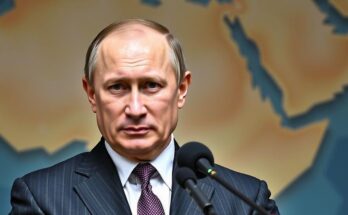Israeli air strikes near Damascus coincide with celebrations in Syria after the fall of the al-Assad regime. The Arab League has condemned Israel’s actions, while Turkey resumes its diplomatic presence in Syria to promote an inclusive government. Tensions remain high with calls for UN intervention and reports of an American citizen being handed over to U.S. forces after being released by rebel groups.
Recent Israeli air strikes have targeted areas near Damascus as tensions escalate in Syria following the fall of the al-Assad regime. The Arab League condemned Israel’s actions, particularly its encroachment on Syrian territory, and called for a meeting of the UN Security Council to address the situation. In response, Turkish Foreign Minister Hakan Fidan announced that Turkiye’s embassy in Damascus will resume operations, indicating Ankara’s commitment to facilitating the establishment of an inclusive Syrian government. Mr. Fidan emphasized the importance of a terror-free Syria while highlighting Turkiye’s objective to eliminate the People’s Protection Units (YPG), which it considers a terrorist organization. Meanwhile, celebrations erupted throughout Syria as the populace gathered in Damascus, some traveling great distances, to commemorate the end of a longstanding regime. Religious observances took place at notable historic sites, such as the Umayyad Mosque. Furthermore, reports have emerged regarding the transfer of an American citizen who was recently liberated from captivity by opposition forces. He was handed over to US authorities after being detained for several months by the previous regime. As developments unfold, major news networks are providing live coverage to ensure the public receives timely updates.
The ongoing conflict in Syria, marked by civil unrest and external interventions, has witnessed significant changes over the past decade. The recent overthrow of President Bashar al-Assad, who ruled Syria with an iron fist, comes amidst widespread dissatisfaction among the populace and international condemnation of his regime’s brutal tactics. The aftermath of his fall has led to various regional powers, such as Turkiye, seeking to assert influence and stabilize the political landscape in Syria. Moreover, the involvement of foreign entities, especially concerning the US-backed YPG and the Israeli military, adds complexity to the evolving scenario. The international community is now called upon to respond to the shifts in power dynamics and address the humanitarian and security challenges that may arise.
In conclusion, the recent developments in Syria signify a profound shift in the political landscape following the fall of the al-Assad regime. As Israeli air strikes raise concerns among regional leaders and the Arab League calls for international intervention, Turkiye’s renewed diplomatic efforts reflect a desire for stability and inclusivity within the Syrian governance framework. Celebrations of newfound freedoms are met with caution as the challenges of rebuilding and securing the nation persist alongside ongoing military concerns. The situation remains fluid, underscoring the need for continued observation and nuanced diplomatic engagement by the international community.
Original Source: www.aljazeera.com




